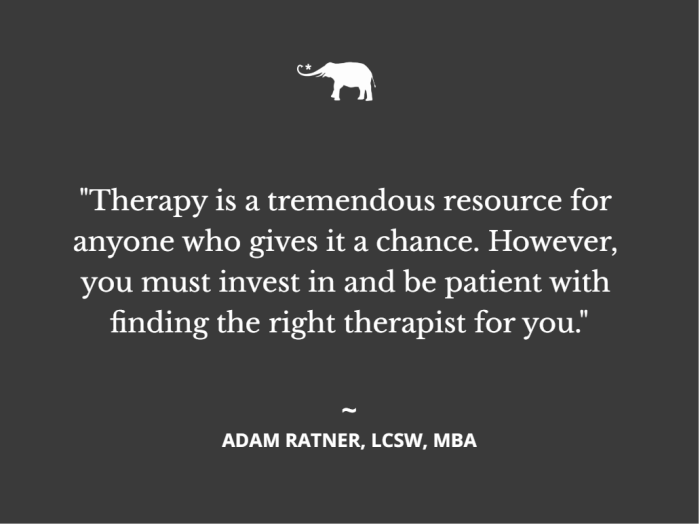“Speed dating” clearly had a purpose in its time, but it has now been replaced by technology that achieves the same objective, and more efficiently.
The objective: gather as much information as possible about another individual, both tangible and intangible, to make a relatively confident decision on whether or not to move forward with dating that person.
As the sun sets on the term “speed dating,” at least from the perspective of romantic pursuits, the sun continues to rise in another space—finding the supports needed to achieve mental wellness through personal and interpersonal growth. It’s like speed dating, but to find the right therapist.
It has become more evident with each passing day—and with new, credible research indicating astounding increases in those challenged with anxiety, depression, interpersonal relationships, addiction, troublesome behavior, divorce, and suicide—that individuals and families are suffering far more psychologically than at any other time in recent memory.
It is sad, it is scary, and people are struggling to find effective ways to truly help themselves and their loved ones.
Unsurprisingly, people are also becoming more desperate and impatient for real help and growth.
Many individuals are familiar with the therapy and counseling profession; however, the process of weeding out the good from the bad and finding the right therapist match is no easy task. In fact, this is the trickiest component in the therapy process. A myriad of research has shown that the most impactful variable to achieving positive change in therapy, irrespective of other considerations, is the therapeutic alliance between you and your therapist. In many cases, I advise new clients to assess their therapist and their approach in working with them for the first couple of sessions to ensure they have confidence in the individual therapist and they feel at ease.
Nevertheless, the burnout in searching for a therapist is real—I am seeing many of those needing help give up on therapy and draw conclusions about effectiveness based on a single experience with one human being.
So, what should you do?
First, do not give up! Only you have control over your choices and behavior. No matter the resistance and discomfort, two options exist: throw in the towel and accept your pains as part of your identity or acknowledge the inevitable uncertainty of this process and do what you can to find the best path to growth and fulfillment for yourself.
How do I know if my current therapist is not right for me?
For first-time therapy seekers, it is unlikely that you have any sort of certainty about the therapeutic process. You are either ready to completely unload (you’ve hit your breaking point) or are going to enter therapy reserved due to natural fear of being vulnerable with someone, who at that time, is a complete stranger. Vulnerability is a gift we give to other people as it is something that can always be used against us. This is why we make decisions to the contrary.
Your current therapist may not be right for you if:
>> You are struggling to feel comfortable sitting in the room with your therapist, and continue to feel this way after many sessions.
>> You feel judged or shamed by your therapist for the personal or interpersonal challenges presented.
>> You feel your therapist has their own biases, which conflict with your own.
>> You feel your therapist has their own agenda for your growth that strays from your own goals.
>> You feel unchallenged by your therapist—assuming this is your desire for growth.
>> You feel unimportant or unheard based on your therapist’s demeanor or dialogue with you in the room—i.e. their inattentiveness and inability to be present.
>> You feel little support or empathy.
Remember, we are looking for likeability and feeling at ease when it comes to this person. Clearly, we want the inverse of the above list.
For therapy seekers who are not new to therapy, your experience will serve you well as you can draw on what has worked in the past and what has not in terms of what you are looking for in a therapist moving forward.
>> Do you work better with males or females from a comfort perspective?
>> Do you want someone who will hold you accountable and be direct?
>> Do you prefer the integration of humor?
>> Do you prefer specific therapeutic approaches (Cognitive Behavioral Therapy, Dialectical Behavior Therapy, Acceptance and Commitment Therapy, EMDR, trauma-focused, psychodynamic, or psychoanalytic to name a few)?
>> How often do you need to go to stay on a path to growth?
>> What type of personalities do you prefer to work with and be around?
Use your inner personal instincts. Sometimes, our gut feeling is the strongest variable in play. Your feelings are your feelings. If you leave a therapy session feeling like something is missing or discomfort with the relationship, trust your instincts. There are other therapist options that may expedite your own healing and restoration.
If you stay with a therapist who is wrong for you, you are most likely going to be frustrated with yourself later for not taking action sooner as your personal growth becomes hindered.
What can I do to ensure the best possible outcome in matching with the best therapist for me?
The best advice I can give is to do your due diligence in advance, and trust your gut and feelings while sitting with your individual therapist.
>> Do your research to find the “right fit”—ask friends for referrals, look for highly reviewed private practices or mental wellness agencies in your area, and ask school social workers (for children or teens).
>> Do your research on what you are looking for—for example, if you are struggling with depression and anxiety, look up treatment methods and ensure the therapists you are considering provide them.
>> Do the hard work of using our friends Google, Bing, or the like to search for local practices using the keywords for what you are most challenged with at present.
>> Be flexible with your times—some of the most desirable therapists have full schedules due to a community’s mental health needs, as we have seen here in Naperville, Illinois. It helps to be flexible with this process to give you the best opportunity to find the ideal match for you
>> Consider credentials and experience—LPC, LSW, MFT, LCPC, LCSW, LMFT, and PsyD are the big ones.
>> Lastly, do not be hesitant to tell your current therapist that treatment may not be working to achieve your goals. It is healthy to re-evaluate yourself and your supports to ensure you are getting what you need!
Therapy is a tremendous resource for anyone who gives it a chance. However, you must invest in and be patient with finding the right therapist for you. If you choose not to, you are choosing to settle and put a ceiling on your personal growth, which might be the very reason you are pursuing therapy in the first place.
Best of luck on your journey! You are worth it.









Read 1 comment and reply